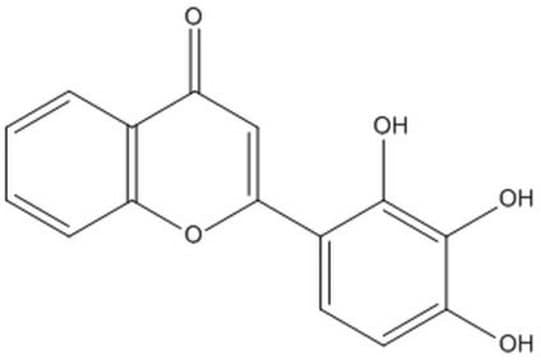345887
Ginkgolic Acid (15:1)
A cell-permeable anacardic acid analog that inhibits protein SUMO .
Sinónimos:
Ginkgolic Acid (15:1), (Z)-6-(Pentadec-8-enyl)-2-hydroxybenzoic acid, Histone Acetyltransferase Inhibitor VI, PCAF Inhibitor II, SUMOylation Inhibitor, HAT Inhibitor VI, Histone Acetyltransferase Inhibitor VI, PCAF Inhibitor II, SUMOylation Inhibitor, (Z)-6-(Pentadec-8-enyl)-2-hydroxybenzoic acid, HAT Inhibitor VI
About This Item
Productos recomendados
Quality Level
assay
≥98% (HPLC)
form
solid
manufacturer/tradename
Calbiochem®
storage condition
OK to freeze
protect from light
color
white
solubility
DMSO: 100 mg/mL
ethanol: 100 mg/mL
shipped in
ambient
storage temp.
−20°C
InChI
1S/C22H34O3/c1-2-3-4-5-6-7-8-9-10-11-12-13-14-16-19-17-15-18-20(23)21(19)22(24)25/h7-8,15,17-18,23H,2-6,9-14,16H2,1H3,(H,24,25)/b8-7-
InChI key
YXHVCZZLWZYHSA-FPLPWBNLSA-N
General description
Packaging
Warning
Reconstitution
Other Notes
Legal Information
signalword
Warning
hcodes
Hazard Classifications
Aquatic Chronic 4 - Skin Sens. 1
Storage Class
11 - Combustible Solids
wgk_germany
WGK 3
flash_point_f
509.9 °F - (calculated)
flash_point_c
265.5 °C - (calculated)
Certificados de análisis (COA)
Busque Certificados de análisis (COA) introduciendo el número de lote del producto. Los números de lote se encuentran en la etiqueta del producto después de las palabras «Lot» o «Batch»
¿Ya tiene este producto?
Encuentre la documentación para los productos que ha comprado recientemente en la Biblioteca de documentos.
Los clientes también vieron
Contenido relacionado
Select different protease inhibitor types based on your needs to prevent protein degradation during isolation and characterization and safeguard proteins in sample prep.
Select different protease inhibitor types based on your needs to prevent protein degradation during isolation and characterization and safeguard proteins in sample prep.
Select different protease inhibitor types based on your needs to prevent protein degradation during isolation and characterization and safeguard proteins in sample prep.
Select different protease inhibitor types based on your needs to prevent protein degradation during isolation and characterization and safeguard proteins in sample prep.
Nuestro equipo de científicos tiene experiencia en todas las áreas de investigación: Ciencias de la vida, Ciencia de los materiales, Síntesis química, Cromatografía, Analítica y muchas otras.
Póngase en contacto con el Servicio técnico









